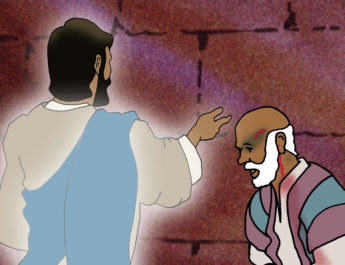Ephesians 2:11-22
Ordinary B34 &
Narrative Lectionary
11 So then, rememberA that at one time you GentilesB by birth,C
A “remember” = mnemoneuo. From mnemon (mindful) OR from mneme (memory or mention); {from mnaomai (to remember; by implication give reward or consequence) or mimnesko (to remind or remember; memory through an active, intentional process or being mindful; not incidentally or accidentally remembering); or form meno (to stay, abide, wait, endure) or from massaomai (to chew, gnaw); from masso (to knead, squeeze)}. This is to remember, recollect. It does not necessarily imply remembering something that you forgot – it could be simply calling something to mind. It can mean to punish or rehearse.
B “Gentiles” = ethnos. Probably from etho (a custom or culture). This is people who are united by having similar customs or culture. Generally, it is used to refer to Gentiles. This is a tribe, race, nation, or Gentiles in general. This is where the term “ethnicity” comes from.
C “by birth” = en + sarx. Literally “in flesh.” Sarx may be from saroo (to sweep, cleanse by sweeping); from sairo (to brush off). This is flesh, the body, human nature, materiality, kindred. Flesh is not always evil in scripture (as when it refers to Jesus taking on a human body). However, it is generally used in a negative way for actions made selfishly and not through faith. This can mean animal flesh, i.e. meat, or refer to body in contrast to soul/spirit. Flesh can be a way of talking about how things or people are related or talking about human frailty (physical or moral).
calledD “the uncircumcision”E by those who are called “the circumcision”F—a physical circumcision made in the fleshG by human handsH—
D “called” = lego. This is to speak, say, name, call, command. It is generally to convey verbally.
E “uncircumcision” = akrobustia. Perhaps from akron (end, tip, top, extreme); {related to akantha (thorn bush, thorn); from ake (point, edge)} + posthe (penis). This is foreskin – so, someone who is not circumcised or a Gentile.
F “circumcision” = peritome. From peritemno (to circumcise; literally cut around); {from peri (about, concerning, all around, encompassing) + same as tomos or tomoteros (sharp or keener); from temno (to cut as with a single slice)}. This is properly, cut around, referring to the way that foreskin is removed and so this is to circumcise. It can be used or the rite or the people who are circumcised – in a literal or figurative sense.
G “in flesh” = en + sarx. Same as “by birth” in v11. See note C above.
H “made….by human hands” = cheiropoietos. 6x in NT. From cheir (hand in a literal sense; figuratively, the means a person uses to accomplish things so it can mean power, means, or instrument); {perhaps from cheimon (winter, storm – winter as the rainy season); related to the base of chasma (chasm, gap, gulf); from chasko (to yawn)} + poieo (to make, do, construct, cause). This is literally made by hand, i.e. artificial. It can also mean to perform.
12 remember that you were at that timeI withoutJ Christ,K being aliensL from the commonwealthM of Israel,N
I “time” = kairos. This is season, opportunity, occasion. The word chronos is used for chronological time. Kairos is used for spiritually significant time – the right time or appointed time.
J “without” = choris. Perhaps related to “made…by human hands” in v11. From chora (space, land, region, fields, open area); from chasma (see note H above). This is apart from, without, detached. Figuratively, it refers to something that is separate and therefore changing its status (valid or not valid).
K “Christ” = Christos. From chrio (consecrate by anointing with oil; often done for prophets, priests, or kings). Literally, the anointed one, Christ. The Greek word for Messiah.
L “being aliens” = apallotrioo. 3x in NT. From apo (from, away from) + allotrios (something or someone that belongs to others; by extension, another, stranger, foreign, or foreigner); {from allos (other, different, another; this is one more of the same kind or a similar type)}. This is to alienate, exclude, be an alien.
M “commonwealth” = politeia. 2x in NT. From politeuomai (literally to live like a citizen; figuratively, to conduct oneself as a citizen does); from polites (citizen, townsperson); from polis (a city or its inhabitants; is a town of variable size, but one that has walls); probably from the same as polemos (war, quarrel, strife; battle, whether one time or on-going); {from pelomai (to bustle) or from polus (much, many, abundant)}. This is citizenship, community, freedom, or polity. It is where the word “polity” comes from.
N “Israel” = Israel. From Hebrew Yisrael (God strives or one who strives with God; new name for Jacob and for his offspring); {from sarah (to persist, exert oneself, contend, persevere, wrestle, prevail) + el (God or god)}. This is Israel the people and the land.
and strangersO to the covenantsP of promise,Q having no hopeR and without GodS in the world.T
O “strangers” = xenos. 14x in NT. – including 5x in Matthew 25 of the judgment of the nations “I was a stranger and you welcomed me.” This is foreign or foreigner, an alien or guest. It could also be something new, novel, or strange. This is where the word “xenophobia” comes from.
P “covenants” = diatheke. From diatithemi (to place separately – to make a will or covenant; this is arranging ahead of time how things will be accomplished); {from dia (through, because of, across, thoroughly) + tithemi (to put, place, set, fix, establish in a literal or figurative sense; properly, this is placing something in a passive or horizontal position)}. This is a will, covenant, contract, or agreement.
Q “promise” = epaggelia. From epi (on, upon, against, what is fitting) + aggello (to announce, report); {from aggelos (angel, messenger); probably from ago (to lead, bring, carry, guide, drive)}. This is a summons, promise, or message. It is a formal promise that is officially sanctioned. In the New Testament, this usually refers to a promise made in the Old Testament.
R “hope” = elpis. From elpo (to anticipate, welcome, expect; usually to anticipate positively). This is expectation, hope, trust, confidence faith. The expectation can be abstract or concrete.
S “without God” = atheos. 1x in NT. From a (not, without) + theos (God or a god in general). This is without god or ungodly. It is also where the word “atheist” comes from.
T “world” = kosmos. Perhaps from the base of komizo (to carry, convey, recover); from komeo (to take care of). This is order, the world, the universe, including its inhabitants. Literally, this is something that is ordered so it can refer to all creation. It can also refer to decoration in the sense that something is better ordered and, thus, made more beautiful. This is where “cosmos” and “cosmetics” come from.
13 But now in Christ JesusU you who once were far offV have been broughtW nearX by the bloodY of Christ.
U “Jesus” = Iesous. From Hebrew Yehoshua (Joshua, the Lord is salvation); {from YHVH (proper name of the God of Israel; the self-existent and eternal one); {from havah (to become) or from hayah (to come to pass, become, be)} + yasha (to deliver, defend, help, preserve, rescue; properly, to be open, wide or free, which implies being safe. So, in a causative sense, this is to free someone)}. This is Jesus or Joshua in Greek – the Lord saves or the Lord is salvation.
V “far off” = makran. 9x in NT. From makros (long, long lasting); from mekos (length); probably related to megas (great or large). This is far off, remote, far away in a literal or figurative sense.
W “brought” = ginomai. This is to come into being, to happen, become, be born. It can be to emerge from one state or condition to another or is coming into being with the sense of movement or growth.
X “near” = eggus. This is nearby or near in time.
Y “blood” = haima. This is blood in a literal sense as bloodshed. Figuratively, it can also be used to refer to wine or to kinship (being related).
14 For he is our peace;Z in his flesh he has madeAA both groups into oneBB and has broken downCC the dividing wall,DD that is, the hostilityEE between us.
Z “peace” = eirene. Perhaps from eiro (to join, tie together to form a whole). This is one, peace, quietness, rest, peace of mind, harmony. Peace was a common farewell among Jews (i.e. shalom) and this well-wishing included a blessing of health and wholeness for the individual. This word also indicates wholeness and well-being – when everything that is essential is joined together properly. This is peace literally or figuratively. By implication, it is prosperity (but not in the sense of excessive wealth. Prosperity would have meant having enough from day to day.)
AA “made” = poieo. Related to “made…by human hands” in v11. See note H above.
BB “one” = heis. This is one, first, alone.
CC “broken down” = luo. This is to loose, release, or untie. Figuratively, it can mean to break, destroy, or annul. This is releasing what had been withheld.
DD “dividing wall” = mesotoichon + ho + phragmos. Mesotoichon is 1x in NT. From mesos (middle, among, center); {perhaps from meta (with among, behind, beyond; implies a change following contact or action)} + toichos (a wall; a house or a city wall). This is a partition, a wall in the middle. Phragmos is 4x in NT. From phrasso (to stop, fence in, obstruct); perhaps from phren (diaphragm, heart, intellect, understanding; figurative for personal opinion or inner mindset; thought regulating action; sympathy, feelings, cognition); perhaps from phrao (to rein in or curb). This is a fence, barrier, wall, or hedge. It is a fence literally or figuratively.
EE “hostility” = echthra. 6x in NT. From echthros (hated, an enemy; someone at enmity – deep, personal hatred that cannot be reconciled because it is determined to cause harm; often refers to Satan); from echthos (hatred). This is enmity, hostility, or alienation.
15 FFHe has abolishedGG the lawHH with its commandmentsII and ordinances,JJ
FF {untranslated} = en + ho + sarx + autos. Some manuscripts including “in his flesh.” Sarx is the same as “birth” in v11. See note C above.
GG “abolished” = katargeo. From kata (down, against, according to, among) + argeo (to delay, linger, be at rest, be idle, do nothing); {from argos (inactive, idle, lazy, thoughtless, useless, unemployed, unprofitable) {from a (not) + ergon (word, task, action, employment)}}. This is making something inactive or bringing it to nothing. So, it could mean making something inoperative or powerless, annulling, or severing. It can also mean to make something ineffective or invalid.
HH “law” = nomos. From nemo (to parcel out). Literally, this is that which is assigned. It can be usage, custom, or law. This word can be used for human or divine law. It can be used specifically for the law of Moses or as a name for the Torah (the first five books of the Bible). Sometimes it is used for scripture as a whole, used of the Gospel, or of any theology. It is also used for the “tradition of the elders,” which would be the oral Torah – the tradition of the laws plus their interpretations as they were passed down over time. We must carefully consider which meaning of “law” is meant when we interpret passages the word is found in.
II “commandments” = entole. From entellomai (to charge, command, give orders or instructions) {from en (in, on, at, by, with) + tellomai (to accomplish) [from telos (an end, aim, purpose, completion, end goal, consummation, tax; going through the steps to complete a stage or phase and then moving on to the next one)]}. This is an order, command, ordinance, or law. It focuses on the purpose of the command and its end result.
JJ “ordinances” = dogma. 5x in NT. From dokeo (to have an opinion, seem, appear, suppose; a personal judgment; to think); {from dokos (opinion). This is opinion, ordinance, or decree. It could be civil or religious. It is where the word “dogma” comes from.
that he might createKK in himself one newLL humanityMM in place of the two, thus making peace,
KK “create” = ktizo. 15x in NT. Probably akin to ktaomai (to get, purchase, possess). This is to build, create, form, shape. It refers to God’s acts of creation.
LL “new” = kainos. This is not new as in new versus old. This is new in the sense of novel, innovative, or fresh.
MM “humanity” = anthropos. Probably from aner (man, male, husband) + ops (eye, face). This is human, humankind. Used for all genders.
16 and might reconcileNN both groups to GodOO in one bodyPP through the cross,QQ thus putting to deathRR that hostility through it.
NN “reconcile” = apokatallasso. Related to “being aliens” in v12. 3x in NT. From apo (from, away from) + katallasso (to reconcile, change, or exchange; a moment when two parties come together in reconciliation and both parties change as a part of it); {from kata (down, against, among) + allasso (to change, transform); {from allos (see note L above)}}. This is to fully reconcile, to enter a new realm of feeling.
OO “God” = Theos. Related to “without God” in v12. See note S above.
PP “body” = soma. Perhaps from sozo (to save, heal, rescue); from sos (safe, well, rescued). This is body or flesh. It can be body in a literal or figurative sense (as the body of Christ). This is where the word “somatic” comes from.
QQ “cross” = stauros. From the same as histemi (to stand, cause to stand). This is an upright stake, cross. Literally refers to the horizontal beam of a Roman cross, generally carried by the one convicted to die.
RR “putting to death” = apokteino. From apo (from, away from) + kteino (to kill). To put to death, kill, slay. Figuratively, this word can mean abolish, destroy, or extinguish.
17 So he came and proclaimedSS peace to you who were far off and peace to those who were near; 18 for through him both of us have accessTT in one SpiritUU to the Father.VV
SS “proclaimed” = euaggelizo. Related to “promise” in v12. From eu (well, good, rightly) + aggelos (see note Q above). This is evangelize – literally to preach the good news. It can be those who hear the news, the news, or a way to say gospel.
TT “access” = prosagoge. Related to “promise” in v12 & “proclaimed” in v17. 3x in NT. From prosago (to bring near, approach, summon, present); {from pros (at, to, toward, with) + ago (see note Q above)}. This is to approach, access, come near, interact with in person.
UU “Spirit” = Pneuma. From pneo (to blow, breath, breathe hard). This is wind, breath, or ghost. A breeze or a blast or air, a breath. Figuratively used for a spirit, the human soul or part of us that is rational. It is also used supernaturally for angels, demons, God, and the Holy Spirit. This is where pneumonia comes from.
VV “Father” = Pater. This is father in a literal or figurative sense. Could be elder, senior, ancestor, originator, or patriarch.
19 So then you are no longer strangers and aliens,WW but you are citizens withXX the saintsYY and also members of the householdZZ of God,
WW “aliens” = paroikos. 4x in NT. From para (by, beside, in the presence of) + oikos (house – the building, the household, the family, descendants; the temple). This is a stranger, foreigner. Literally, it is someone who lives near on a temporary basis. It is one who is not a citizen and does not have full rights or identification.
XX “citizens with” = sumpolites. Related to “commonwealth” in v12. 1x in NT. From sun (with, together with) + polites (see note M above). This is a fellow citizen. Figuratively, it can refer to another Christian.
YY “saints” = hagios. From hagnos (holy, sacred, pure ethically, ritually, or ceremonially; prepared for worship, chaste, unadulterated, pure to the core; undefiled by sin; figurative for innocent, modest, perfect). God is totally different from humanity and thus set apart. That which is consecrated to worship God (elements of worship) or to serve God (as the saints) are holy because they are now set apart for God’s purposes. Holy because important to God. This is sacred physically, pure. It can be morally blameless or ceremonially consecrated.
ZZ “members of the household” = oikeios. Related to “aliens” in v19. 3x in NT. From oikos (see note WW above). This is domestic, related to the family, relative.
20 builtAAA upon the foundationBBB of the apostlesCCC and prophets,DDD with Christ Jesus himself as the cornerstone.EEE
AAA “built” = epoikodomeo. Related to “aliens” and “household” in v19. 7x in NT. From epi (on, upon, among, what is fitting) + oikodomeo (to build a house or be a house builder. Figuratively, it can mean to edify or encourage, be strong or embolden); {from oikos (see note WW above) + demo (to build)}. This is to build on according to a plan or on a foundation. Figuratively, it can mean to rear.
BBB “foundation” = themelios. Related to “covenants” in v12. 16x in NT. From tithemi (see note P above). This is related to a foundation, building substructure. It is a foundation in a literal or figurative sense.
CCC “apostles” = apostolos. From apostello (to send, send away, send forth as a messenger, to commission); {from apo (from, away from) + stello (to set, arrange, prepare, provide for)}. This is a messenger – someone sent out on a mission as an envoy or delegate. It can also refer to someone set at liberty. Generally, this is a messenger who is meant to be a representative of the one who sent them. They are thus, set apart on a mission literally or figuratively.
DDD “prophets” = prophetes. From pro (before, in front of, earlier than) + phemi (to declare, say, use contrasts in speaking to shed light on one point of view); {from phao (to shine) or phaino (to bring light, cause to appear, shine, become visible or clear)}. This is a prophet or poet – one who speaks with inspiration from God.
EEE “cornerstone” = akrogoniaios. Related to “uncircumcision” in v11. 2x in NT. From akron (see note E above) + gonia (corner, quarter, hidden place); {from gonu (knee, feet)}. This is a corner or cornerstone.
21 In him the whole structureFFF is joined togetherGGG and growsHHH into a holyIII templeJJJ
FFF “structure” = oikodome. Related to “aliens” and “household” in v19 & “built” in v20. 18x in NT. From oikos (see note WW above) + doma (house, housetop; often used to refer to the roof) {from demo (see note AAA above)}. This is the act of building, structure, architecture, a building, upbuilding. It is a building that is used as a home. Figuratively, this refers to spiritual progress – becoming a person who is a better home in which God can reside.
GGG “joined together” = sunarmologeo. Perhaps related to “so” in v19 & “called” in v11. 2x in NT. From sun (with, together with) + harmos (joining, joint); {from ararisko (to join together) or harma (a chariot or other vehicle); {probably from airo (raise, take up, lift, remove)} + lego (see note D above). This is to join together, fit, be interconnected. It refers to a harmonious whole.
HHH “grows” = auxano. From auksano (to grow or enlarge, whether literal or figurative). This is growing whether in size or mature or greatness or some other metric.
III “holy” = hagios. Same as “saints” in v19. See note YY above.
JJJ “temple” = naos. From naio (to dwell, inhabit). This is a place for God (or a god) to live – a sanctuary, shrine, or temple. It is a place for God or a god to manifest. For the Jewish Temple, it is used of the Temple itself and the two inner chambers.
in the Lord;KKK 22 in whom you also are built togetherLLL spiritually into a dwelling placeMMM for God.
KKK “Lord” = Kurios. From kuros (authority, supremacy). This is a respectful address meaning master or sir. It refers to one who has control or power greater than one’s own. So, it was also applied to God and Jesus as Master or Lord.
LLL “built together” = sunoikodomeo. Related to “aliens” and “household” in v19 & “built” in v20 & “structure” in v21. 1x in NT. From sun (with, together with) + oikodomeo (see note AAA above). This is build together, construct. Figuratively, building up together with the church.
MMM “dwelling place” = katoiketerion. Related to “aliens” and “household” in v19 & “built” in v20 & “structure” in v21 & “built together” in v22. 2x in NT. From katoikeo (to live or settle on a permanent basis); {from kata (down, against, according to, among) + oikeo (to settle or be established somewhere in a permanent way, to make a home or live at home); {from oikos (see note WW above)} + –terion (a place). This is an abode or place where one lives.
Image credit: “The Power of Harmony” by pasukaru76 (Pascal), 2013.




